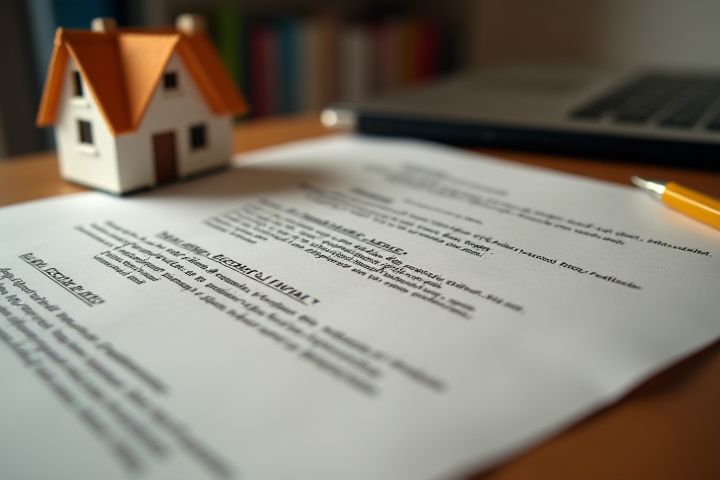
It is essential to retain several key house documents for effective home management and legal protection. Start by keeping the title deed, which proves your ownership and outlines property rights. Your mortgage documents, including the original agreement and any subsequent amendments, are crucial for understanding your loan terms and responsibilities. Home insurance policies should also be stored securely, as they provide coverage details for any potential damages. Don't forget to maintain records of significant repairs and renovations, as these can enhance your property's value and aid in future resale efforts.
What House Documents To Keep
Property deeds
Property deeds are essential legal documents that establish ownership of real estate. Retaining copies of your property deed, typically issued by your local county recorder's office, ensures that you can prove your ownership in case of disputes. It's advisable to keep documents related to any mortgage condition, such as loan agreements or releases, to maintain clarity on financial obligations. Always store these documents in a secure place, preferably a fireproof safe or a digital format, to protect them from loss or damage.
Mortgage documents
Mortgage documents are crucial for understanding your financial responsibilities and maintaining ownership of your property. You should retain the mortgage note, which outlines the loan terms, interest rate, and repayment schedule. The mortgage agreement, detailing the obligations and rights of both you and the lender, is also essential. Keeping track of any addendums or modifications to the original mortgage can help ensure transparency and prevent potential disputes.
Property tax records
Property tax records are essential documents to maintain, as they provide proof of your ownership and can impact your financial obligations. It's crucial to keep records of tax assessments, payment receipts, and any correspondence from tax authorities. Retaining these documents for at least five years is advisable, especially if you intend to appeal an assessment or verify your property valuation. By staying organized with your property tax records, you can ensure accurate reporting and be prepared for any future transactions involving your home.
Home insurance policy
Your home insurance policy is a critical document that outlines coverage details, including dwelling protection, personal property coverage, and liability limits. It's essential to keep this policy in an easily accessible location, as it contains vital information for filing claims in the event of damage or loss. Be aware of the renewal dates and policy limits to ensure adequate coverage; adjustments may be necessary based on renovations or acquisitions of valuable items. Store a copy of the policy alongside other essential documents, such as your mortgage agreement and property deed, for comprehensive financial protection and peace of mind.
Title insurance
Title insurance is critical for protecting your investment in real estate, covering potential issues like liens, fraud, or discrepancies in property ownership. Keep essential documents related to title insurance, such as the title policy itself, as it outlines the coverage terms and conditions. Additionally, retain any communication with the title company, including binders, endorsements, and settlement statements, which provide crucial details about the transaction. Maintaining these documents ensures you can effectively address any title-related concerns that may arise in the future.
Home improvement receipts
Home improvement receipts are essential documents that play a critical role in maintaining the value of your property. They provide a detailed record of expenses incurred during renovations or repairs, which can be invaluable during tax season or when selling your home. Retaining receipts for significant upgrades, such as kitchen remodels or roof replacements, can also validate the quality of your improvements for potential buyers. Organizing these documents, along with warranties and permits, ensures you have all necessary information at hand when managing your home investment.
Appliance warranties
When managing appliance warranties, it's crucial to retain the original purchase receipts, which typically include essential details like the model number and date of purchase. Keep warranty registration cards, as registering your appliance can extend coverage and facilitate service claims. Make a digital or physical file for any service records or repair invoices, documenting each incident to track warranty validity. Storing these documents securely can help streamline the repair process, ensuring you have the required information at hand whenever needed.
HOA agreements
When managing your HOA agreements, it's important to retain specific documents to safeguard your interests. Key documents include the original governing documents, such as the Declaration of Covenants, Conditions, and Restrictions (CC&Rs), which outline your rights and responsibilities. Additionally, keep copies of meeting minutes, financial statements, and any amendments to the original agreements for transparency and accountability. Regularly reviewing these documents will help you navigate any changes or disputes involving the community association effectively.
Zoning permits
Zoning permits are critical documents that govern land use and property regulations within your area. These permits outline the specific usage allowed for your property, whether residential, commercial, or agricultural. Keep records of any zoning applications, approvals, or denials, as they can impact property value and future development opportunities. Retaining this documentation can also prevent legal complications, ensuring compliance with local zoning ordinances.
Lease agreements
Lease agreements are crucial documents that outline the terms and conditions between landlords and tenants. Keeping a copy of your lease ensures you have a clear understanding of rental duration, monthly payment amounts, and any security deposit requirements. It's vital to also store any amendments or extensions to the lease, as these modifications can affect your tenancy rights. Regularly reviewing these documents can help you address any potential disputes and maintain a transparent landlord-tenant relationship.
